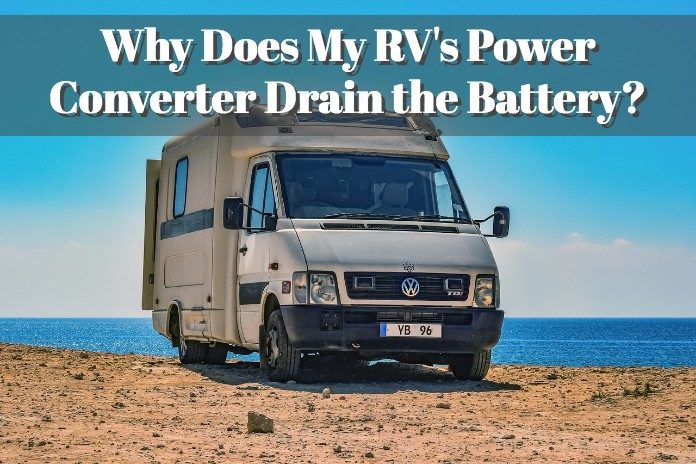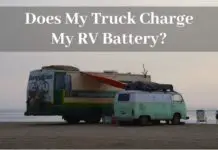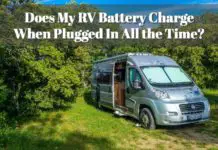
Modern RVs are far more luxurious than the vehicles that you may have grown up with. Gone are the days when you would be forced to use a portable “chemical loo” and a gas stove.
Today, some RVs can be as comfortable as a small apartment, with showers, toasters, hair driers, and even full-sized TVs. You can live in luxury, assuming your battery and wiring are up to the task; however, the RV converter draining battery power is a common complaint.
But is it really true? The answer is no! When you connect the converter to your RV, you might notice a spark because when you connect the converter for the first time, it consumes power from the battery. But the power draw is low to negligible and certainly will not have an impact on your battery’s performance.
First of All, What Does the Power Converter Do?
On paper, the RV power converter should take power from the grid and turn it into power that the RV’s appliances can use. This is ideal for when you’re at a campsite, and you want to save your battery power and use their grid instead.
In theory, when you’re hooked up to the grid, the converter should supply appliances without touching the battery. Sometimes this doesn’t happen, and that is often a sign that there’s a problem with the battery.
If you have a battery problem with your RV power converter, then i highly recommend you to read this article.
Here is the Reason Why Your RV Converter Drains the Battery
When you hook up a converter to your RV, you might see a spark. This is normal because the converter does draw a tiny amount of power when it is first connected. The drain is very small, and it should not really be noticeable if your battery is working correctly, but there is still some drain. If your battery is starting to die, then the drain might be more pronounced than you expect.
A lot of people see that spark and mistakenly assume that any problems they have with their batteries are down to the converter being connected. This is not usually the case. After that initial spark, the power drain is incredibly small. If your battery is properly charged, you should not see any drop-in charge from using appliances while the converter is connected.
Batteries that discharge over a period of a day or two when sitting idle are usually damaged or nearing the end of their life. The average deep-cycle battery can be reasonably expected to last for about five years, but there are many things that can impair the condition of a battery.
If your battery has been exposed to rapidly changing temperatures or has not been recharged properly or conditioned, then you might see issues where it discharges over time when idle.
Could You Have a Wiring Problem?
Of course, there is always the possibility that your RV does have a shorted wire somewhere or some other problem that causes power to be taken from the battery even when you have a power converter connected. To rule out that possibility, fully charge the battery and measure the charge.
Disconnect the battery from everything and leave it for a couple of days, then measure the charge. If the battery is in good condition, then it should still have roughly the same amount of charge. If it is in need of replacement, then you will notice a drop in charge even though it is no longer connected to the same circuit as the converter.
It is also possible that you might have a short or a problem with an outlet that is constantly pulling power from the battery. If you are not a qualified electrician, then you should not try to investigate such problems. Seek professional advice instead.
Caring for Your RV Batteries
So, if your RV’s power converter is most likely not the real culprit for your battery problems, how can you make sure that after you replace your battery, you don’t run into problems again?
The two most important things are charging and storage. Use a proper battery charger or trickle charger to maintain your battery. In the winter, make sure that you take good care of the battery.
The best way to store an RV battery is indoors at a stable temperature. If you leave your RV at a campsite over the winter, consider disconnecting the battery and taking it home with you. There is liquid in RV batteries, and cold temperatures are very bad for them.
While RV batteries survive freezing better than they survive the cells being flooded, it’s still not something you want to happen.
Keep the batteries at a stable temperature as much as possible. Every month test the battery to make sure the charge has not fallen below 80 percent. If the battery has started to discharge, recharge it.
If you cannot take the batteries home with you, disconnect everything that you can in the RV. Even small things such as alarm clocks and smoke detectors will drain a very small amount of energy, and over a period of many months, it can be enough to suck the power out of the battery. Of course, you will need to reconnect these things as soon as you return to the RV in the spring or summer.
Disconnect the converter too. While the converter takes its own power from the grid, it tries to do double duty as a charger, and if you leave the converter plugged in a while there is no energy being used in the RV for a prolonged period this can do the equivalent of boiling the RV battery dry, since it’s going to be passing a tiny amount of charge, and there’s nowhere for that charge to go.
RV batteries do best when they are kept in stable conditions, with regular use and recharging. Once they have been frozen, flooded, or otherwise damaged, it can be hard to bring them back to life. In many cases, the best option is to replace the battery because it will behave in unusual ways, and you can’t count on it to hold a charge for a long period of time.
As you can see, an RV converter draining battery power, or at least appearing to drain it, is not unusual. It is something that can be worked around, however. Try the fixes above, and if you still have no joy, consider replacing the battery.
Sources:
1. How Does a DC to AC Power Converter Work? – Sciencing
2. 10 Tips to Extend the life of RV Batteries – KOA Camping Blog





